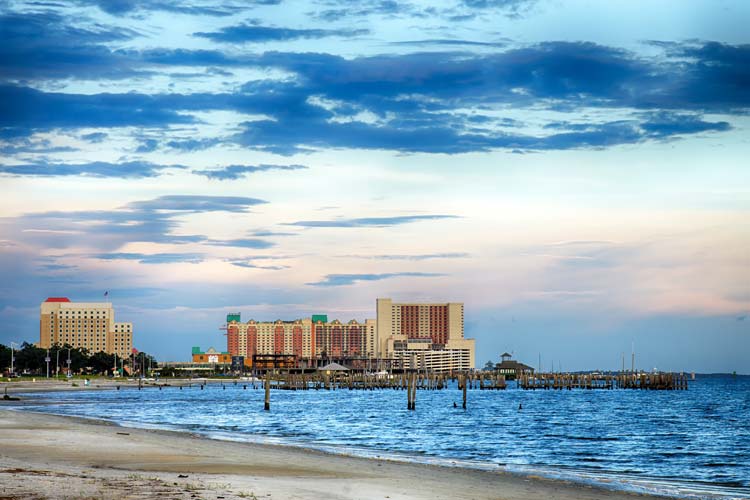
Riding out a hurricane in a hotel room and potentially being stranded with minimal resources is disconcerting to say the least. But is it even safe to stay in a hotel room during a hurricane, and how can you prepare to make sure that you’re as safe as possible?
Is a Hotel Safe during a Hurricane?
The first thing you should know is that if you can evacuate, you should. In fact, if a hurricane is on the way and you’re on vacation, get out as soon as possible before it’s too late.
When a hurricane watch is issued, the most important thing you can do is stay tuned to weather broadcasts and listen to local officials. You can take some steps to prepare, such as:
- Getting gas for your rental car and locate evacuation routes
- Getting cash
You can use your hotel as a resource for a lot of information. Many hotels will post a "what to do" list in the lobby, including what you can do to stay safe in your room and what the evacuation route is from the hotel.
If there is a mandatory evacuation and you don’t have a rental car, find out if the hotel will provide transportation or if you have to secure your own.
Once a hurricane warning is issued, continue to monitor weather information and local instructions. Pack your bags, making sure not to take anything you can’t carry easily, but also that you have vital belongings like valuables and medical supplies. Be sure to secure water and other necessary survival supplies.
If an evacuation order is issued, leave immediately according to local instructions. Take your belongings with you.
If you are going to ride out in the storm in the hotel, it’s time to prepare your room. Listen to communications from the hotel management and local officials. While sheltering in your room, you should:
- Close the curtains and stay away from the windows to avoid the possibility of flying glass
- Fill your bathtub with water, which you may need later
- Make sure all of your phones are fully charged
- Pack your bags and leave them and your shoes by the door, ready to go
The hotel may instruct its guests to move out of individual rooms and into safer areas without windows. In this case, have a “bug out” bag available that contains medications, identification, travel documents, valuables, electronics and charging cords, snacks, water, and pen and paper.
What to Do if You’re Hurt during a Hurricane?
Injuries are an unfortunate reality during a hurricane, and emergency response times can be delayed and phone service can be limited. If you’re seriously injured, it’s important to try to seek urgent medical attention by calling 911.
Car accidents
As people rush to get out of high-risk areas or flee after the storm hits, car accidents are common. Be sure to have in your car a survival kit that includes first aid items that may help you treat minor injuries while you wait for paramedics.
Water-borne infections
Floodwater from hurricanes can be heavily contaminated by sewage and toxic chemicals. It can also hide broken glass and other sharp items and debris. Cuts sustained in this type of environment are more susceptible to serious infections. Be prepared to treat cuts immediately with your first-aid kit, and then seek appropriate medical attention.
Food poisoning and dehydration
People may be more likely to consume spoiled food after a hurricane because of interruptions in utility services. Don’t take the risk. Dispose of any perishable food if the power is out for several hours. Be sure you have plenty of water and non-perishables before the storm hits so you’re not tempted to consume unsafe foods, and so you can avoid dehydration. If you experience a food-borne illness, seek appropriate medical attention.
Carbon monoxide exposure
Carbon monoxide poisoning can happen if you’re using a backup or portable generator for power after the storm. If you’re going to use a generator, make sure you also have working carbon monoxide detectors, and never operate a generator inside a closed area even if windows and doors are open. If you experience signs of carbon monoxide poisoning, seek immediate medical attention.
Broken bones and heavy bleeding
Serious acute injuries may occur as a result of the hurricane and even during the cleanup. Broken bones and internal or external bleeding can result. If you experience a suspected broken bone or bleeding, seek immediate medical attention.
What if Your Valuables are Damaged during a Hurricane?
Your Mississippi homeowners insurance policy does more than just protect your home, it also helps protect your belongings when you’re away from home. If your personal possessions were stolen, lost, or damaged while you’re on vacation, even during a hurricane, you likely have coverage under your Mississippi homeowners policy.
Is Your Hotel in a Hurricane High-Risk Zone?
If you’re going on vacation, it makes sense to know if your destination is in a high-risk zone for hurricanes, especially during hurricane season.
Hurricanes are most common in the United States during the Atlantic and Pacific hurricane season. The Atlantic hurricane season begins June 1 and ends November 30, while the Pacific hurricane season is a bit longer, from May 15 to November 30.
According to data from the National Hurricane Center (NHC), about 36 hurricanes have hit the US from 1995 to 2017, 13 of which have been considered major hurricanes, or a Category 3 or above at the time when they made landfall.
States along the eastern seaboard, the southeastern US, and the Gulf Coast are most susceptible to hurricanes. Mississippi is among the top 10 states for hurricanes in the US.
Article Reviewed by | Paul Martin